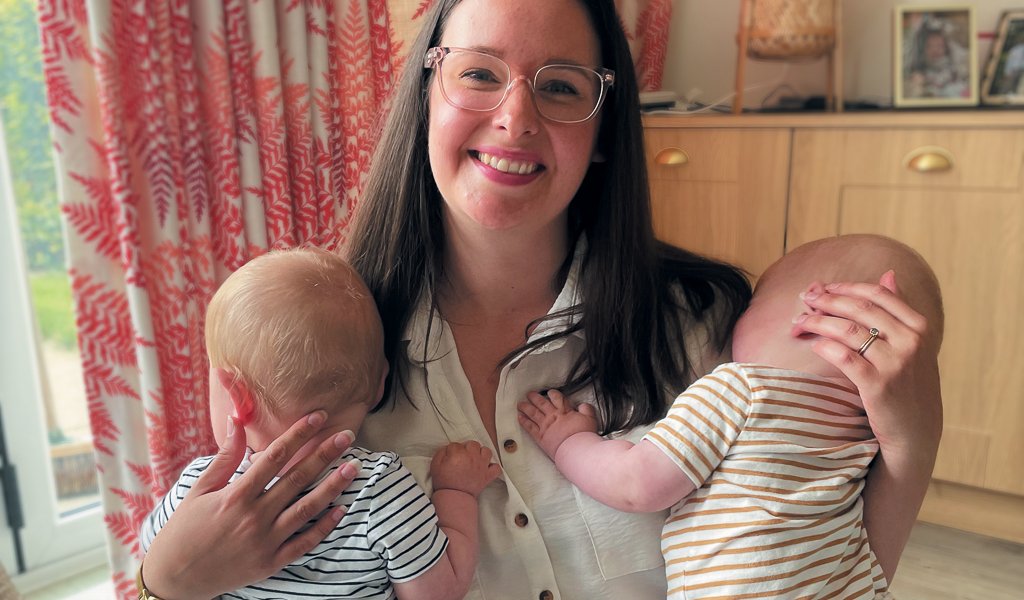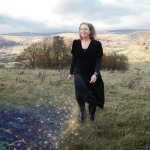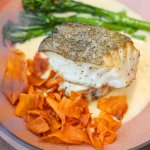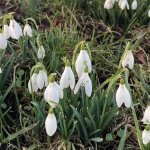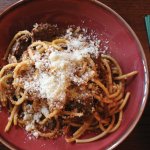The birth of a baby is one of life’s most precious moments … yet it’s also when we are at our most vulnerable. Doula Hannah Poulter empowers women to experience pregnancy and birth on their own terms, as Fiona Stubbs discovers.
HANNAH Poulter and her year-old twin boys are all smiles as they snuggle and play together at home. As a mum to the boys and their two-and-a-half-year-old sister, Hannah enjoys a happy family life. But behind the smiles lurk memories of traumatic pregnancies which ultimately led her to leave behind a corporate career and, in a bid to help others, to train as a doula. Taken from a Greek word, meaning helper or caregiver, the term doula now describes a non-medical professional who provides emotional and physical support to women in pregnancy, childbirth and postpartum (after the birth).
Hannah’s change of career is a timely move, coinciding with calls for greater care and support for women during and after pregnancy. In May, an inquiry into traumatic childbirth recommended an overhaul of the UK’s maternity and postnatal care after finding poor care was “all too frequently tolerated as normal”.
The Birth Trauma Inquiry heard that an estimated 30,000 UK women each year suffered negative experiences during delivery of their babies – with one in 20 developing post-traumatic stress disorder.
Women complained they were not listened to when they thought something was wrong and gave accounts of injuries – to themselves and their babies – during birth.
Hannah was unsurprised by the findings. “In the lead-up to the birth of my daughter, seven close family and friends had traumatic births which ended in an emergency caesarean,” she says. “I wanted to eliminate as much risk to my own birth as possible but it felt as though I didn’t have any choices in how it went.
“I already thought the whole narrative around pregnancy and birth was quite disempowering and on other people’s terms rather than what the mother wants. I also noticed the distinct lack of education and support available to people going through this huge life transition.
“I was surrounded by well-meaning friends and family but they didn’t really understand what was going on and were saying the wrong things.”
“Antenatal education classes are available, however they only really tell expectant parents about hospital policies. They don’t really go into the ‘why’, which is a huge factor in making informed decisions.”
Hannah’s feelings intensified with her second pregnancy. “It was traumatic from the moment we found out they were twins,” she explains. “I was given a leaflet with all the awful things that might happen. We had weekly scans and were told one of the twins might not make it.
“I felt so alone and so unsupported through the whole thing as I had no one to really talk to. I was surrounded by well-meaning friends and family but they didn’t really understand what was going on and were saying the wrong things.”
Hannah adds: “Postpartum was so hard, too. After going through a traumatic experience, it felt as though I just had to carry on as my family needed me. There was no room to process anything or get any real help.
“Over a third of births are categorised as traumatic but I actually think it’s more. I speak to more parents who’ve had a negative experience than a positive one. I just think the horrible things that happen have become so normalised we don’t feel we can call it traumatic because it’s what we’ve come to expect.”
A turning point for Chesterfield-based Hannah came while she was pregnant with the twins – and she discovered the role of doula for the first time in an Instagram post by Radio One presenter and former Saturdays singer Mollie King.
Mollie’s dad, Stephen, was diagnosed with a brain tumour during her pregnancy and died days after baby Annabella – who she shares with fiancé, former England cricketer Stuart Broad – was born.
“I was scrolling through Instagram and saw Mollie’s post paying tribute to how her doula had supported her through the ‘highest of highs and lowest of lows’,” Hannah recalls. “I didn’t know the service existed but I started to research doulas and thought it was amazing. I was an account manager in the healthcare sector and had been looking to change careers but this was a truly awakening moment.
“I started training when the boys were three months old – and that was incredibly healing for me, too. Having a doula is not just for the rich and famous – it’s for everyone and, particularly in our modern, fast-paced lives, we need that support. The experiences you have during childbirth set you up for the rest of your parenting life.”
Hannah says the most important part of her role as doula is empowering women during this most vulnerable time. “Feeling heard, validated and like you’re the one in control is what transforms someone’s experience.
“I support my clients through pregnancy, birth and postpartum by providing a safe space to explore their options, giving them time to make decisions. I can provide information and emotional and practical support, enabling people to feel confident in their choices and focus on what’s important to them.
“It’s about being listened to and making sure you’re heard. A lot of birth trauma isn’t about what happened but how it happened. It’s about people feeling cared for and having all their options. Looking back, if I’d had somebody to support me the way I support my clients, I think I would have been happier with my experience.”
Hannah is keen to point out the role of a doula is not to criticise maternity services but to complement them – adding extra care and support for women and their families.
She says: “Everybody signs up with the intention of caring for women and they want to make a difference, but services are so stretched and people have different needs during pregnancy and birth.
“Some want to go down the research route, others need more emotional support. Not everyone has friends and family to turn to and, for those who don’t, it’s important they have the right support. My approach is to listen, to ask the right questions and make sure that all the information is being given to them.
“For those who do have family and friends to turn to, is it the right support? Sometimes we think we are being helpful by sharing our own stories or those of other people, but it’s important to give a woman space where she can feel listened to and understood. That’s the empowerment part. I offer impartial support, where women can explore their thoughts and feelings without judgement.
“During pregnancy we build a birth plan together, working out what’s important to the clients. Birth can be unpredictable, so we don’t just have a plan A, but plans B and C too. It’s about making sure they are okay if things change. My work is completely dependent on their needs. I’m there whenever they feel they need me and I’m with them until the baby has arrived.”
One of the most special parts of her role is when she is in the delivery room as a new life enters the world. “I feel so privileged,” she says. “It’s amazing watching a family being formed.”
Following the birth, Hannah is still available for practical or emotional support. “Some people value a birth debrief and I think that’s important, especially if the birth didn’t go the way they’d expected,” she explains. “It’s important to talk about it and come to terms with it.
“The postnatal period is a very transformative time. I think we have to normalise that it isn’t always as easy as people make out. We have a ‘bounce back’ culture and praise women for being out at coffee shops with a buggy a week after delivery. If that’s what they want to do, then great. But we should also recognise that giving birth is a huge experience to go through … and recovery is needed, too.
“As a doula I facilitate whatever the new family needs in order to be able to focus on the baby and their own recovery. I don’t tell anybody how to do anything – there’s no right or wrong way. I support them to do whatever they feel is a good thing for them as a parent.”
Editor’s Note: Learn more about Hannah’s work as a doula at www.youdoulayou.co.uk

